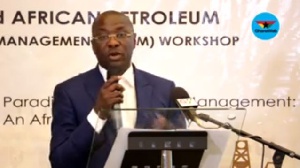 Mohammed Amin Adam, Deputy Energy Minister
Mohammed Amin Adam, Deputy Energy Minister
The Deputy Minister for Energy, Mohammed Amin Adam has stated that government will approve a Downstream Petroleum Financing Policy to address costly financing challenges hindering the supply of petroleum products on the Ghanaian market.
He made this statement at the 5th edition of the Ghana Gas Forum held in Accra themed ‘Driving Ghana’s Downstream Gas Utilisation’.
He said a comprehensive Gas bill is being drafted to consolidate the gas sector regulations to meet emerging global regulatory landscape.
According to him, utilising gas for industrial development will help facilitate low-cost industrialisation – including reducing the environmental cost and other externalities associated with oil-based development.
The Deputy-Minister noted that competitive pricing is key to derive gas-based industrialisation, because it has become a leading concern and requirement from accelerated industrialisation for cheaper inputs.
“Government has pursued the gas sector with the intent to accelerate industrialisation, and therefore adopted the Gas Masterplan which has provided a roadmap that could position the gas industry as the leading contributor of value-added industrialisation in Ghana,” said Mr. Amin Adam.
Touching on the increase in petroleum prices, Mr. Adam revealed that significant interventions on tax component in petroleum prices, covering reductions in petroleum prices and abolishment of some, have been put in place to address concerns of the high rise in petroleum prices.
“Government appreciates the legitimate worries of our people and we are making significant interventions that will address these concerns without derailing the benefits of the deregulated pricing market.
To date, the tax component in petroleum prices has been reduced by government from 40% in March 2017 to 26% currently,” he noted.
Another measure which the minister said has been put in place is reviewing demand and supply side strategies, including long-term initiatives.
“On the demand side, we are improving the mass transport system by increasing the fleet of buses in our streets and the development of railway infrastructure for both inter- and intra-city movement. And on the supply side, government is addressing cedi-depreciation and exploring avenues to remove supply bottlenecks.”
In an interview, Chairman for the forum-Kwame Pianim, noted that to have a sustainable sector Ghana has to feed its power generation with gas. He said: “Our industries will have to change from electricity energy to using gas. The most important thing is that the pricing has to be competitive”.
Executive Secretary of the Gas Consortium, Senam F. Gbeho, said this year’s forum centred on influencing policy decisions in the energy sector – with specific focus on natural gas as a catalyst for development.
He noted that the event also provided innovative ways of increasing downstream gas utilisation toward government’s agenda of leveraging the country’s gas resources for industrialisation.
The Ghana Gas Forum promoted a close partnership among key industry players – including the Ministry of Energy, Ghana National Gas Company and Ghana National Petroleum Corporation – in policy discussions.
It also featured a new session named the ‘CEO Interactive Session’ on Day-2, structured to enable decision-makers share their upcoming work plans with peers, service providers and interested participants.
This session provided an avenue for dissemination of information relating to development of the gas sector, offering participants an opportunity to gain deeper insights and market intelligence which can bolster their respective businesses’ strategic plans.
The Gas Consortium is an independent non-profit policy advocacy organisation that promotes the contributions of government policymakers, experts, practitioners and industry stakeholders to the policy formulation process. It does this to ensure that policy plans support the gas sector’s effective management and lead the country’s goal of leveraging its gas resources for industrialisation and economic transformation.